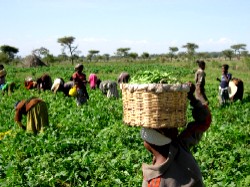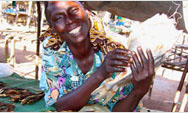You are here » Home » Telling Our Story
Success Story
Cooperatives organize small farmers, improve produce quality and boost prices
Small Farmers Become Exporters

| |
Photo: USAID/Kristina Stefanova
|
|
At the Dodicha Vegetable Cooperative, women and children pick green beans that will be sold to a local exporter, who will sell them to supermarkets in Europe.
"We had a lot of problems before these linkages were made," said Ethioflora Manager Mulugeta Abebe. "The farmers were not coordinating.… They needed to learn how to cultivate and use irrigation."
|
Each day, when the women and children finish picking green beans, they weigh their harvest and pour the contents into crates. The beans are then hauled away and graded, packed and shipped to the airport in Addis Ababa. Within a few days, those beans will be on the shelves of a European grocery store.
This wasn't always the way. Until recently, Ethiopian farmers worked independently on small plots, selling their produce locally for about 12 cents a kilogram. Meanwhile an exporter, Ethioflora Horticulture Farm, lost sales because it could not produce enough beans to meet export demand.
Then three years ago, USAID began supporting an effort to organize farmers into cooperatives, improve irrigation and produce high-quality beans to sell to Ethioflora at four times local market prices. The program increased production on small farms, and Ethioflora has expanded sales in Europe and successfully lobbied the Ethiopian government to allow more cargo flights into Addis Ababa.
"We had a lot of problems before these linkages were made," said Ethioflora Manager Mulugeta Abebe. "The farmers were not coordinating.… They needed to learn how to cultivate and use irrigation. All of these things were not possible to do before, but have been done now."
Often when small-scale producers link to an international buyer, they cannot meet production demands due to a lack of technology, skilled labor or transportation. USAID helps cooperatives overcome these obstacles by showing them how to understand and meet export quality standards and operate on sound business principles. In five years, the value of food grains, coffee and sugarcane sold through cooperatives has gone from $1 million to more than $20 million.
Ayu Deme's life has changed since she joined the Dodicha Vegetable Cooperative four years ago. She is one of 155 members who together cultivated 170 acres of irrigated tomatoes and onions for the local market. Last year Dodicha began supplying green beans to Ethioflora, making a significant profit. Ayu says she is now able to send her older children to school, buy clothes for the family and purchase oxen.
Print-friendly version of this page (244kb - PDF)
Click here for high-res photo
Back to Top ^ | 

